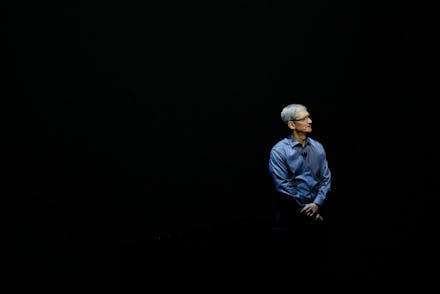At the 2016 Apple Event, Tim Cook Takes a Big Swing at the FBI

At Apple's product release on Monday, CEO Tim Cook had to clear the air. Instead of opening with the announcement of a new phone or tablet, he addressed the government-sized elephant in the room: Apple's battle against the FBI.
"We need to decide as a nation how much power the government should have over our data and over our privacy," Cook told the crowd in Cupertino, California.
The FBI is trying to get into the iPhone of one of the San Bernardino shooters, and has been trying to compel Apple to help it get into the iPhone by building a special firmware update — a mandate that Cook once called "the software equivalent of cancer."
"We did not expect to be in this position, at odds with our own government," Cook said at the event. "But we believe that we have a responsibility to protect your data and protect your privacy. We owe it to our customers and we owe it to our country. This is an issue that impacts all of us, and we will not shrink from this responsibility."
"We believe that we have a responsibility to protect your data and protect your privacy. We owe it to our customers and we owe it to our country. This is an issue that impacts all of us, and we will not shrink from this responsibility." — Tim Cook
Propaganda war: The debacle between Apple and the FBI has been a storm of accusations, doomsday hypotheticals and bad analogies. It's dominated the tech news cycle for the better part of a month as Apple challenges the FBI's demand, polarizing politicians, the tech world and the public.
Black Lives Matter activists and civil rights leaders came out in support of Apple, and John Oliver dedicated 18 minutes of his show to do a deep-dive on explaining the issue.
Meanwhile, the FBI says that the fear-mongering about total worldwide penetration and surveillance of everyone's iPhone is ludicrous — that it simply wants access to one phone.
"We simply want the chance, with a search warrant, to try to guess the terrorist's passcode without the phone essentially self-destructing and without it taking a decade to guess correctly," FBI director James Comey wrote in an open release following the national outrage. "That's it. We don't want to break anyone's encryption or set a master key loose on the land."